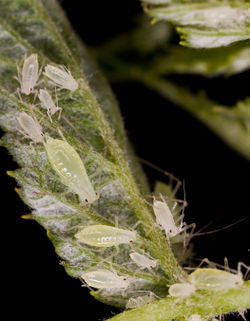Difference between revisions of "Amphorophora agathonica"
| Line 1: | Line 1: | ||
| − | {{ | + | {{TaxLinks|LnkAmphorophora}} |
{{LiteratureDB|{{PAGENAME}}|browse}} | {{LiteratureDB|{{PAGENAME}}|browse}} | ||
| − | [[File:Raspberry aphids.jpg|250px|thumb | + | [[File:Raspberry aphids.jpg|250px|thumb|''Amphorophora agathonica'' (click on image to enlarge it)<br/>Source: U.S. Department of Agriculture - [http://commons.wikimedia.org/wiki/File:Raspberry_aphids.jpg Wikimedia Commons]]] |
<font color="#800000">'''''Amphorophora agathonica'''''</font> Hottes, 1950<br/> | <font color="#800000">'''''Amphorophora agathonica'''''</font> Hottes, 1950<br/> | ||
infests raspberries in the northern parts of North America. It is also a vector of several raspberry viruses. The aphid uses ''Rubus'' as the only host, although it is sometimes found on strawberries. It is not often found associated with ants. For control, the development of resistant raspberry cultivars is in progress. | infests raspberries in the northern parts of North America. It is also a vector of several raspberry viruses. The aphid uses ''Rubus'' as the only host, although it is sometimes found on strawberries. It is not often found associated with ants. For control, the development of resistant raspberry cultivars is in progress. | ||
Revision as of 22:51, 1 September 2014
| Literature database |
|---|
| 10 articles sorted by: |
| • year (recent ones first) |
| • research topics |
| • countries/regions |

Source: U.S. Department of Agriculture - Wikimedia Commons
Amphorophora agathonica Hottes, 1950
infests raspberries in the northern parts of North America. It is also a vector of several raspberry viruses. The aphid uses Rubus as the only host, although it is sometimes found on strawberries. It is not often found associated with ants. For control, the development of resistant raspberry cultivars is in progress.
It overwinters as shiny black eggs which are laid in autumn on the underside of the leaves. In spring, it goes through several asexual generations with the wingless females giving birth to live nymphs. The development from the birth of a nymph to mature female depends on the temperature and may vary from < 2 weeks at 25°C to 3-4 weeks at less than 15°C (Lightle et al., 2014). Winged adults appear in summer and autumn. They disperse and lay eggs in autumn.
The adults are 3-4 mm long with long cornicles and long antenna. They are light to dark green with the winged forms being somewhat darker.